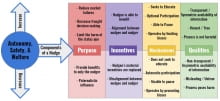Author: Brian Hengesbaugh A nudge is an intervention with the goal of changing behavior by modifying one or more factors that influence how a decision is made, while still maintaining the existing range of options and the material incentive structure for the decision maker (Thaler & Sunstein, 2008). A notification from an app on your phone, … Continue reading “How to Nudge Ethically”
Advanced Settings Plugin Blog Posts
Network Research Highlight: Selecting Fairly
By: Keaton Fletcher A paper recently published in the International Journal of Selection and Assessment by a team of researchers including WSC Advisory Council Member, Deborah Rupp, focuses on an increasingly popular tool that organizations are using to select individuals for hiring or promotion, assessment centers. Assessment centers require participants to engage in a range … Continue reading “Network Research Highlight: Selecting Fairly”
Demographics of Science and Engineering: Are We Improving?
By: Yendi Neil According to a report released by the National Science Foundation (NSF; 2017), the enrollment of historically underrepresented groups (e.g., women, Blacks, Hispanics, Native Americans, Alaska Natives, and individuals with disabilities) in undergraduate institutions is increasing. However, enrollment trends differ across demographic groups. Hispanics, Native Hawaiians or Pacific Islanders, and American Indians or … Continue reading “Demographics of Science and Engineering: Are We Improving?”
Network Research Highlight: Work-Family Conflict is a Barrier for Women
By: Elizabeth Moraff Work Science Center network member Mary F. Fox has focused much of her research on women in research and academia, particularly noting barriers to their advancement. Most recently, she published a reflection on Georgia Tech’s website detailing the insights present research has provided on the way work-family conflict (when work interferes with … Continue reading “Network Research Highlight: Work-Family Conflict is a Barrier for Women”
Tracy Kantrowitz Joins WSC Advisory Council
Date: Tuesday, February 19, 2019 The Work Science Center is overjoyed to announce that Dr. Tracy Kantrowitz has joined our advisory council. Dr. Kantrowitz received her PhD in Industrial-Organizational Psychology with a concentration in quantitative measurement from the Georgia Institute of Technology. A SIOP Fellow, she was elected as Practice Officer for the 2019-2022 term, has chaired … Continue reading “Tracy Kantrowitz Joins WSC Advisory Council”
Who Quits STEM Majors?
By Jacqueline Jung The modern workforce is becoming increasingly science and technology based. Improving the selection and retention of undergraduate students in STEM (Science, Technology, Engineering, and Math) majors is, therefore, increasingly important. Attrition rates are high: more than 1 in 4 students leave college before completing their degree, and it is even more difficult … Continue reading “Who Quits STEM Majors?”
Network Research Highlight: Work is More Than a Paycheck
By: Keaton Fletcher WSC Advisory Board Member, David Blustein, is part of a team led by Kelsey L. Autin that recently published a paper in the Journal of Counseling Psychology that tackles what it means to have your needs satisfied by your work. The authors point toward decent work as a method that allows individuals … Continue reading “Network Research Highlight: Work is More Than a Paycheck”
Lack of Sleep is a Public Health and Economic Concern
By: Riley Swab Sleep is necessary to increase focus and productivity, both vital traits to workers. Japanese workers, however, are accumulating massive sleep debts (i.e., consistently sleeping less than 7 hours per night without rebound sleep such as naps or sleeping in) due to a prevalent mentality that sacrificing sleep means you are working hard … Continue reading “Lack of Sleep is a Public Health and Economic Concern”
Network Research Highlight: Cyber-Vetting May Be Limiting Talent Pools
By: Elizabeth Moraff & Keaton Fletcher A recent paper published by Debora Jeske, Sonia Lippke, and Work Science Center Network Member, Kenneth Shultz, in the Employee Responsibilities and Rights Journal, highlights the increasingly confusing role of social media in job selection. Cyber-vetting is a process in which employers screen potential employees based on information provided … Continue reading “Network Research Highlight: Cyber-Vetting May Be Limiting Talent Pools”
Building a Bridge from Fulltime Work to Retirement
By: Riley Swab Although older workers contribute valuable ideas, knowledge, and experience to the workforce, these can often be overshadowed by their potential loss in innovative ideas and physical abilities (Zacher, Kooij, & Beier, 2018). A solution to this cost-benefit analysis may be bridge employment, which is a type of partial retirement taken between fulltime … Continue reading “Building a Bridge from Fulltime Work to Retirement”










